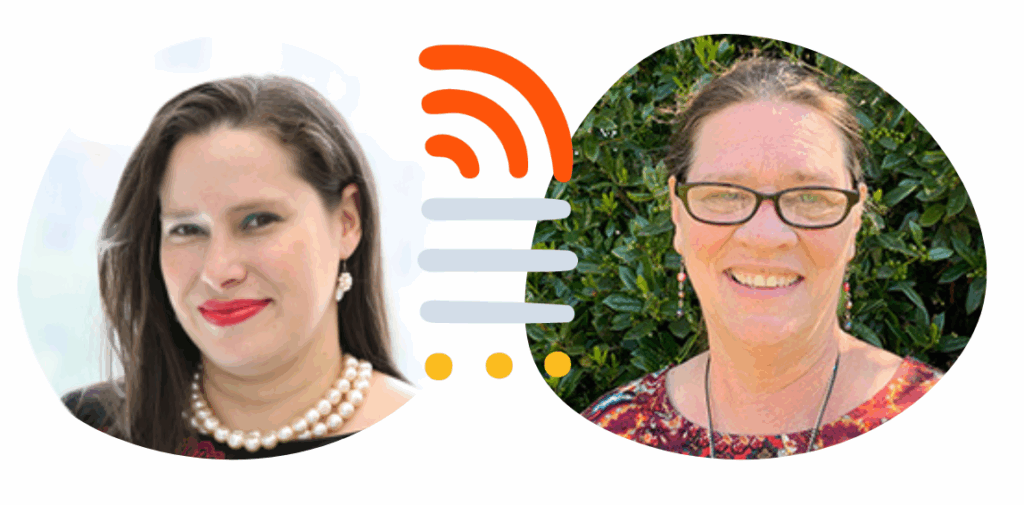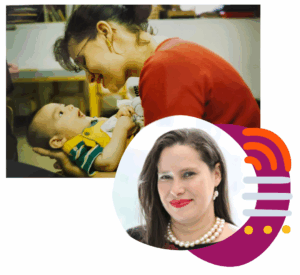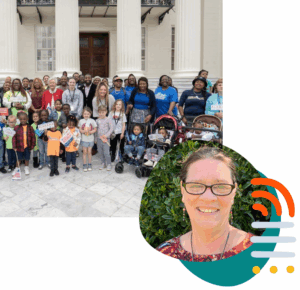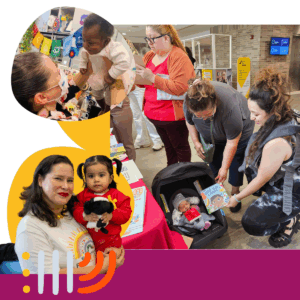
This May, Nurture Connection is honoring Mental Health Awareness Month and creating space to reflect on how Early Relational Health (ERH) can help support the mental health needs of parents and families. The following is adapted from an interview the Nurture Connection editorial team conducted with Tish Macinnis (Parent Leader, ERH Family Network Collaborative; Strengthening Families, Southern Families, Alabama) and Claudia Aristy (Parent Leader, ERH Family Network Collaborative; Reach Out and Read, Spanish-Speaking Immigrant Families, New York).
As parents shared in a previous article featuring reflections on parental stress, families are facing many different stressors and challenges these days. What is currently top of mind for parents and families in your communities?
Tish Macinnis: Here in Alabama, we are still coming off of COVID days. . . . There are a lot of parents who still have not gone back to work, and that’s just because the jobs aren’t there. And the others struggle with their two or three jobs, trying to make a living. We have unfortunately lost several more of our birthing hospitals, and in our community, transportation is limited.
Claudia Aristy: Hearing Tish talk about her community, there are significant differences, and there are things that resonate — that’s what makes this type of work so unique. Like Tish, I see job security as a big issue in the community at Bellevue, where I work — but for different reasons. In the last two years there has been a huge influx of new migrants who have so many needs and who come here with a lot of trauma. In many cases, they’re leaving their kids in their own country to look for a better quality of life for the rest of their family. That separation brings a different level of stress, not knowing if they’ll see each other again.
How open are parents and families when it comes to talking about mental health in the communities you work with?
Claudia: It varies . . . in the Latino culture, the whole topic of mental health is definitely not encouraged. The majority of families probably were brought up with the idea that you don’t talk about your struggles because that makes you seem weak or crazy — a word that is very associated with mental health in my community. It’s not perceived as a sign of strength when you recognize you need help, especially mental and emotional support.
But I have encountered more families who are very open to talking about their struggles and who are even open to considering looking for or accepting help. There is a huge need and desire for connection, but the way they seek it is more peer-to-peer [or through conversations like this], not necessarily, “Oh, I want to talk to a mental health specialist.”
Tish: There are times when a parent reaches out for support, but mostly our culture is to keep mental health and emotional struggles to yourself. We work hard to break that barrier down. Relationship building is a key part of our programs.
Cultivating trust within communities is an important factor in reaching and supporting parents. Who are some of the trusted sources of help when it comes to informal and formal supports on the front lines of working with families?
Claudia: Definitely within the medical community — families hear a very consistent message throughout the hospital that your child’s well-being depends on your well-being. . . . I think they’re starting to associate the medical care team as a source of support. That’s a huge win, because they have so many scheduled visits, especially for parents of very young children. In the first year of life, we have more of an opportunity to continue to reinforce those messages and break down communication barriers by consistently showing support in a warm approach.
Tish: I don’t know how to make the systems better for our parents. I just know that because other parents have been able to tell me where they have received their help, I can make a mental note and help connect other parents in Mobile, Alabama, with programs that will help them. For example, I knew a mother whose two adult children are in Ecuador. She went back to the Head Start program because she had met people there. They didn’t service her daughter (because she was too old for Head Start) — but through this informal way of connecting, she was able to go to them and she was put in touch with me, to connect her with bilingual support and help.
What are some other places or community groups where parents are accessing informal supports (from friends, families, networks, people bringing food, etc.)?
Claudia: What I have seen a lot of, especially within the families that have been living in the shelters, is peer-to-peer support. Someone who has been there longer will tell newer arrivals, “This is where you can go, or this is what you need to do.” Or even referring to them within the hospital setting; let’s say I help one pregnant mom, and that pregnant mom then introduces me to three others. So [in my role] I’m not only telling you about the education of reading to your baby and singing and talking to them, but also guiding and connecting you with all the other services in the hospital.

“That word of mouth within the community is a big component of trust. Do I feel like I can trust this person or this place, before I tell somebody else about it? Because only after having an interaction where they felt seen, heard, valued, and safe will they feel comfortable sharing that with others.”
—Claudia Aristy, Parent Leader, ERH Family Network Collaborative;
Reach Out and Read, Latinx-Speaking Immigrant Families, New York
Claudia: I always make a huge effort not only to refer families to the local forms of support within the hospital, but to explain how things like local libraries can be another way of support. Back home, they might not have had local public libraries that offer so many different services. This is a safe space where you can bring your little one, use the computer, meet other moms . . . they even have a story time for babies, English classes, computer classes. When you explain all of the different services available, they cannot believe it.
How do you see the connection between the promotion of ERH and the mental health and well-being of parents?
Claudia: It’s paramount — how can one happen without the other!
Tish: They can’t be separated. A mother or a father or a caregiver has got to be able to know how to take care of themselves in order to be able to take care of their child.
Claudia: It’s not even only knowing how to do it, but do you even have the capacity to do it? How can you actually be emotionally in tune with your child when you’re not even emotionally in tune with yourself? . . . It’s almost impossible to be able to think about that, if these families are going to be able to nurture that child when they’re not nurturing themselves or society is not nurturing them.
 “A mother or a father or a caregiver has got to be able to know how to take care of themselves in order to be able to take care of their child.”
“A mother or a father or a caregiver has got to be able to know how to take care of themselves in order to be able to take care of their child.”
—Tish Macinnis, Parent Leader, ERH Family Network Collaborative;
Strengthening Families, Southern Families, Alabama
The Power of Recognizing and Affirming Parents
The other thing that we all need to do more is praising our families for the work they’re doing and reassuring them. . . . Too often, they’re only hearing about the thing they’re not doing or that they could be doing better.
Yesterday I met a family of a three-month-old baby who was holding up her head so high and so proud. And then I had the best conversation with that three-month-old. And when I turned and said to the parents, “Congratulations!” they asked, “Why?”
I said, “You’re doing an amazing job — your baby’s telling me. Look at that smile, look at the way the baby turns to look at you and is totally in tune with you. That tells me you are both doing an amazing job.” And I turned and said to the baby, “Aren’t you fortunate to have these amazing parents? That’s why you’re so happy.” And the mom said, “Oh, it’s so good to hear that!”
Because any parent is always wondering, Am I doing enough? Am I being a good parent? Because not only is the outside world expecting you to do a good job, but your own internal struggles and expectation for yourself.
So regardless of where we encounter families, I think we can do better — just giving that pat on the shoulder.
–Claudia Aristy
Parent Leader, ERH Family Network Collaborative;
Reach Out and Read, Latinx-Speaking Immigrant Families, New York


This is part of an ongoing series on parental stress, featuring reflections from the ERH Family Network Collaborative (FNC) and Nurture Connection community.